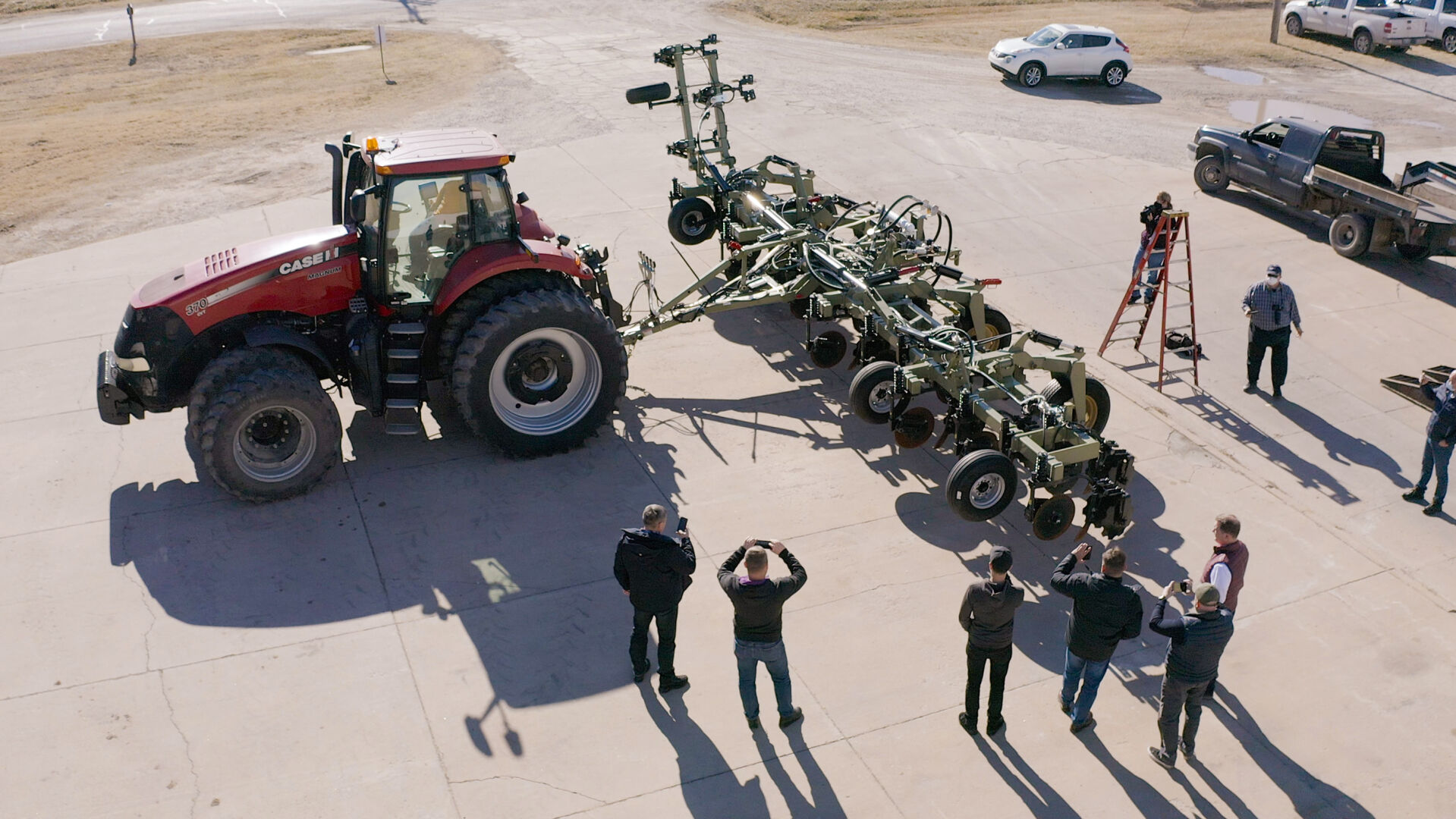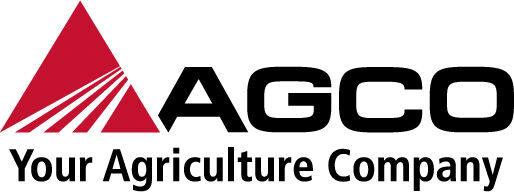A mesh of expertise from several Kansas firms holds promise for major farm-based exports to eastern Europe in 2021, and possibly beyond.
The endeavor was hatched by three Kansas businessmen who sport international connections, savvy government helpers and talent from multiple state regions.
If all works out as planned, four representatives of more than 1 million acres in two Ukrainian farms—visitors to Kansas in late February—will soon be working with cutting-edge equipment purchased from the middle of the United States.
Ukrainians from those farms that collectively encompass more than 1,563 square miles, and Sergii Kovalchuk, an importer and implement dealer from central Ukraine, made several stops in Kansas, eyeing cutting-edge innovations.
“We hope to have a strong partnership regarding filling needs with very high quality equipment,” Kovalchuk said. “We need strong steel equipment with modern technology.”
While Kansas has a much warmer climate than Ukraine, growing seasons are similar. Primary crops, ranked in order of importance, are corn, oilseed sunflowers, soybeans, winter wheat, grain sorghum and sugar beets.
“They have the ability to expand their agriculture, and they’re really begging for western technology,” said Mike Bergmeier, president of ShieldAg Equipment, of South Hutchinson, Kansas.
“We’re uniting multiple small companies with specialists working together to get a finished solution to these guys, their farming customs, conditions and crops,” said Daniel Rauchholz, founder and president of Farmada in Salina, Kansas.
“They get to work together on this piece of equipment. They all have their own specialties,” said Suzanne Ryan-Numrich, international trade director at the Kansas Department of Agriculture.
A veteran of pitching American farm equipment around the world—through his time as international division president of Salina, Kansas-based Great Plains Manufacturing—Rauchholz responded to an inquiry from the Ukrainians through the U.S. Commercial Service.
“They were not happy with what other companies are offering right now, and were looking for a solution,” he said. “They want to work closely with a U.S. supplier that does not offer them standard, off-the-shelf products, but works with them to tailor the entire product to meet their specific needs.”
Cookie-cutter farming equipment doesn’t fit with Ukrainian specifications, he said, such as row spacings that are different than in the U.S.
“These guys are familiar with me from my days at Great Plains, and were not aware that I was in business for myself,” Rauchholz said. “That’s how we realized we’d be a good fit, through personal relationships and reputation.”
Kovalchuk emphasized that the farmers he serves, whose operations range from 500 to 500,000 hectares (1,200 acres to more than 1.2 million acres), prefer a “personal approach” to serving their needs.
“This is the biggest, paying attention and customizing equipment to our conditions,” he said. “Having this strategy we will guarantee in our market. We rely on the wide experience of Daniel.”
Those attributes were key in the recent trip to Kansas.
“They came to us because we listen,” Bergmeier said.
The collaboration centers around the Elxir, pronounced like the word elixir, a new and rugged fertilizer applicator that Rauchholz and the Farmada team designed and developed.
Several of the machines were tested in Kansas and the Corn Belt. They are available up to 65 feet wide, and can cover 40 to 50 acres an hour. They continue to be manufactured and assembled by Grain Belt Supply in Salina.
ShieldAg provides the ground engaging components—“the things working in the dirt,” Rauchholz said—necessary in applying anhydrous ammonia along with dry or liquid fertilizer.
“They have some of the best ground-engaging components on the market. That’s why I’m partnering with them,” he said.
SureFire Ag Systems, of Atwood, Kansas, supplies the fertilizer delivery components, everything from the anhydrous tank, safety gear, anhydrous coolers and manifolds, said Nicholas Bowles, SureFire Ag’s international sales manager.
“You don’t have to reinvent the wheel when somebody has something that’s already working awesome,” Rauchholz said. “You just integrate that wheel into your product.”
The company makes fertilizer control systems for many types of equipment, he said.
“We’re very excited to work with this group of folks from the Ukraine,” Bowles said. “We’re always trying to expand what we’re doing overseas. When Daniel said he was thinking about bringing a group of guys in, I got pretty excited.”
All three men are experienced in serving agriculture overseas, particularly Ukraine.
ShieldAg currently sells in Ukraine, Russia and Kazakhstan in eastern Europe, and eight countries in the European Union.
The opportunity was created by the U.S. Commercial Services office of the U.S. Embassy in Ukraine, Bergmeier said.
“Daniel and I have always talked about doing things to help one another, to improve our market penetration,” he said. “It’s very exciting, because it allows us to do some things we’re good at.”
The Kansans were approached by A.J. Anderson of U.S. Commercial Services to launch a trade mission to Ukraine, but COVID restrictions made it impossible.
“You can’t find a businessman (from the U.S.) who can quarantine 14 days to go over the Ukraine, and then 14 days to come back home,” Bergmeier said.
All it took for the Ukrainians was a “negative COVID test to get on the plane,” Ryan-Numrich said.
“Then we talked about this reverse trade mission, because it made sense to do it in a different way,” Bergmeier said. “Anyone involved in Kansas export trade is very excited about this idea.”
The visitors toured manufacturing plants, and an anhydrous ammonia supplier in Smith Center, Kansas.
“To me, it’s crucial for them to get to see the equipment in person,” Ryan-Numrich said.
Bowles has had recent trips to Ukraine canceled because of COVID, but he’s been able to spread the word about SureFire Ag through video conferencing with customers and colleagues.
Working through a number of government groups, it took five months for Rauchholz and his partners to make the trip to Kansas happen, also including the Small Business Administration, the state’s Congressional delegation, the Kansas Department of Agriculture, Kansas Department of Commerce and Kansas Lt. Gov. David Toland.
The visit proved to be a boost in many areas for Kansas, that exports nearly $12 billion in goods annually, said Katie Sawyer, state director for U.S. Sen. Roger Marshall.
“Kansas is fortunate to not only have some of the most talented farmers and ranchers in the world, but also some of the most talented engineers and manufacturers, working every day to deliver solutions for on-the-farm needs,” she said. “ShieldAg, Farmada and SureFire Ag represent some of the best innovation in agriculture technology today and they can all be found in rural Kansas. I am proud of the work they are doing and want to continue doing all I can to ensure these companies and others can continue to connect with farmers around the globe. It is imperative we do all we can to help our small businesses connect with potential clients, no matter where they live.”
Appreciation runs both ways.
“We have to give credit to Kansas. We have good government here,” Rauchholz said. “All have been very helpful in connecting us with arrangements and support.”
Much of this Kansas collaboration is unique, said Ryan-Numrich of the state agriculture department.
“It’s a product that’s been developed and components manufactured by Kansas companies, all of those companies in rural parts of Kansas,” she said. “We don’t see something like that very often.”
As trade missions go, having one in reverse is “pretty rare,” Ryan-Numrich said.
The state agriculture department often sponsors a STEP grant trade mission to the Agro Ukraine trade show, but it is impossible this year, she said.
“We’ve come off a year that’s been pretty challenging in terms of travel and meeting with international customers. To have them visit our state and see the equipment first hand and meet with the people who are building it, I think, is pretty neat. This reverse trade mission makes sense.”
The Kansas partners believe in their expertise and are proud to shout it around the world.
“I’ve been telling them how our products work and why they’re better,” Bowles said. “I was talking (recently) to a John Deere dealer in Ukraine, telling them how our sales are really up. He made the comment that several folks were wanting SureFire fertilizer systems on their planters.”
He’s confident the Elxir will handle the challenging Ukrainian farming conditions.
“It seems like they intentionally push things harder,” Bowles said.
Ukrainian farming practices are similar to Kansas and the Corn Belt, Rauchholz said.
“It depends on where you are and the crop rotations. Some will be no-till, tillage and minimum till,” he said. “The biggest issue with Ukraine is the farms are larger than most U.S. farms, and the acres put on a machine in a season might even be greater than the average commercial operator in the U.S.”
The Elxir is acing tests in the Corn Belt, Rauchholz said.
“Those are the most difficult conditions, with high residue and high-yielding areas,” he said. “If the machines prove themselves there, they will prove themselves in other areas as well.”
Rauchholz is so far happy with this collaborative effort, and won’t rule out future endeavors.
“Right now, the emphasis will be hitting the market hard with the products we’ve already designed,” he said. “As we get feedback from our customers and partners, we will evaluate additional projects, based on their merits.”
Those include, according to Rauchholz: “Does it reduce costs, increase yield, improve efficiency, save time, incorporate the latest technologies and boost market potential?”
Tim Unruh can be reached at [email protected]


